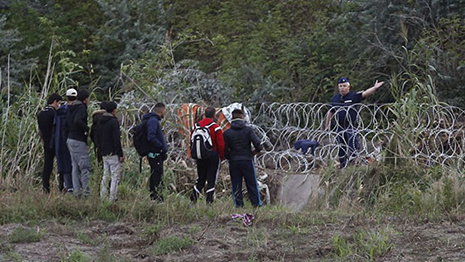"It is in the interest of all of us, Hungarians and Europeans, to develop some kind of order," Kovacs told the Associated Press, warning that otherwise many European cities could face unsustainable situations.
Hungary is attempting to build a 13-foot-high fence to keep out the migrants, many of whom are from Syria. However, the Associated Press reported that record numbers are crossing the border in what is being called E.U.rope`s worst refugee crisis since the end of World War II.
Police said that 2,533 migrants were detained on Tuesday, up from 2,093 on Monday and by far the highest figure of the year. About 140,000 migrants have reached Hungary already this year, over three times as many as in all of 2014. Over the past week, the average was nearly 1,500 people a day.
After requesting asylum and registering with authorities, migrants are sent to one of Hungary`s refugee centers but most try to quickly leave for richer E.U. countries like Germany or Sweden.
The so-called Balkan corridor for migrants is becoming increasingly popular as migrants seek to avoid the dangerous boat crossings in the Mediterranean from North Africa to Italy.
So far, the Hungarian border fence consists of three layers of razor wire, which the government says will be completed this month along the 109-mile border. But there`s no wire over railroad lines and roads and there are doors on the fence where the migrants can enter and formally seek asylum. Once they do, they can easily slip from Hungarian asylum centers and head further west and north.
Hungary, beleaguered by the influx and facing a right-wing backlash, has been rushing to build the fence both as a physical barrier and a symbol of its tough anti-foreigner stance. The government`s anti-migrant billboard campaign and efforts to link migration with terrorism have drawn sharp criticism from the U.N. and others, who say it vilifies refugees and promotes xenophobia.
"Building fences, using tear gas and other forms of violence against migrants and asylum seekers, detention ... will not stop migrants from coming or trying to come to E.U.rope," said Francois Crepau, the U.N. special rapporteur on the human rights of migrants. "Let`s not pretend that what the E.U. and its member states are doing is working. Migration is here to stay."
Scores of migrants were seen Tuesday morning by Associated Press journalists near the border town of Roszke, climbing over or crawling under the barbed wire to enter Hungary -- just as they had done at the Greek-Macedonia border.
About a dozen migrants from Syria, including men, women and a child, were seen by AP journalists as they walked with their backpacks through a cornfield to the border fence. An elderly woman managed to cross over the wire fence, then two Hungarian policemen showed up and stopped the rest, telling them to go to an open gate instead.
The group hesitantly walked into Hungary one by one, escorted by the police.
After entering, the migrants are taken to processing stations where they are registered and then sent by train to refugee centers around the country. The majority request asylum, but most quickly leave for other E.U. countries before their claims are settled.
Abdul Munir Rahimi, a 33-year-old from Kabul, Afghanistan, said he and his family were aiming to go to Germany. His brother, his sister-in-law and their two children were hoping to take a taxi to the Hungarian border later in the day.
"No security in Afghanistan, no security," he said. "We have relatives in Germany."
More about:
















































